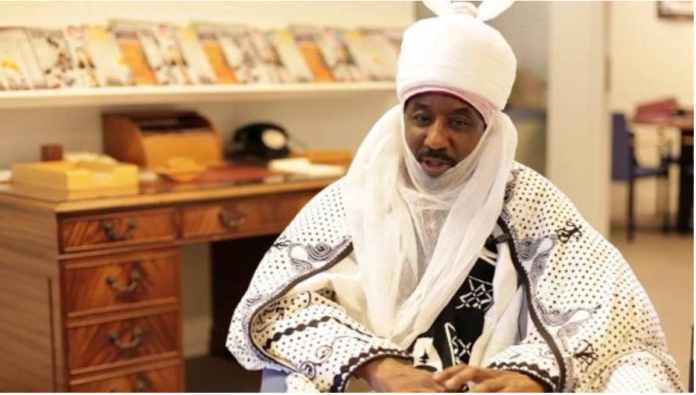Tinubu shouldn’t be Petroleum Minister, it makes scrutiny difficult, he says
By Jeph Ajobaju, Chief Copy Editor
Bola Tinubu being both President and Petroleum Minister makes it difficult to ask questions and scrutinise the activities of the Nigerian National Petroleum Company (NNPC) known for monumental corruption over the years, Lamido Sanusi has argued.
Sanusi, former Central Bank of Nigeria (CBN) and former Kano Emir, said Tinubu being Petroleum Minister, like his predecessor Muhammadu Buhari, deepens the opaqueness of the NNPC and frustrates investigation of N11 trillion fuel subsidy payment in the oil and gas sector.
“I am fearless,” Sanusi claims in an advert currently running on Arise News.
Former President Goodluck Jonathan (2010-2015) appointed a Petroleum Minister in Diezani Alison-Madueke, the most powerful member of his cabinet who now faces the prospect of jail in the United Kingdom over alleged bribe taking while in office.
Buhari appointed one Minister of State for Petroleum (Ibe Kachukwu) in his first term and another in his second and final term (Timipre Sylva) and made himself Petroleum Minister throughout his eight years in office.
That gave Buhari the leeway to award oil blocs and contracts to whomever he liked and whichever way he liked, everything in secret – without been questioned whatsoever.
Tinubu split the ministry into two in August with the appointment of Ekperipe Ekpo as Minister of State, Gas Resources; and Heineken Lokpobiri as Minister of State, Petroleum Resources. Like Buhari, he appropriated the office of Petroleum Minister.
Sanusi bared his mind at an event organised by the Bank Directors’ Association of Nigeria in Abuja, where he said the President being also Petroleum Minister has deprived Nigerians the opportunity to hold the Petroleum Minister accountable since 2015.
His words: “The National Assembly [NASS] called NNPCL [Nigerian National Petroleum Company Limited] to bring the documents. They refused.
“And by the way, let me advise that this idea of the President being a Petroleum Minister is not a good idea. The last President was the Minister of Petroleum for eight years.
“When I was Governor of the Central Bank, we had a Petroleum Minister. So, when I talk about NNPCL, people will say I am attacking the President.
“Now, nobody can talk about Petroleum. Because [in those] eight years, if you talked, you were attacking the President. We need that buffer. Somebody has to be there. A Minister has to be there, who is held accountable by the people.”
__________________________________________________________________
Related articles:
Profligate Tinubu budgets N7.63b for foreign travels in 2024
PDP warns Tinubu deceiving Nigerians with 2024 budget lacking recovery inputs
Atiku and Obi accuse Tinubu of wasting funds with 1,411 delegates at COP28
Afenifere presses Tinubu to walk his talk on true federalism
__________________________________________________________________
“We need to shine a light on NNPCL”, Sanusi insists
Sanusi wondered why the NNPC is not able to bring in dollars from the sale of oil, per reporting by The Guardian.
“Where are the dollars? We need to shine a light on NNPCL.”
He argued that if the government does not know how much oil the country produces, it would not be able to fix leakages either.
“Where is the money saved so far since the petrol subsidy ceased?”
“The Central Bank does not manufacture dollars. It is not an exporter. It produces naira. It can buy dollars. It can create an environment for dollars to come in. It can bank dollars for the government.
“But it does not produce dollars. If you want to have stable tax rates, you’ve got to go back to those issues we raised in 2014. You need to follow the money.”
Sanusi sought a radical departure from the way things are currently done, for Nigeria to be able to produce more oil.
He also faulted the ongoing attempt at amending the CBN Act, stressing that if a law is not being implemented as it should, the operators are the ones called to question.
He urged the NASS to stop politicising the CBN in its role and policies.
Also at the event, Fidelity Bank Chairman Mustapha Chike-Obi restated the support of financial institutions to the reforms the CBN has introduced so far, saying their response to the growth agenda is impressive.
He implored the CBN to hold meetings with bank chairmen twice a year for the two sides to brainstorm the financial sector.




